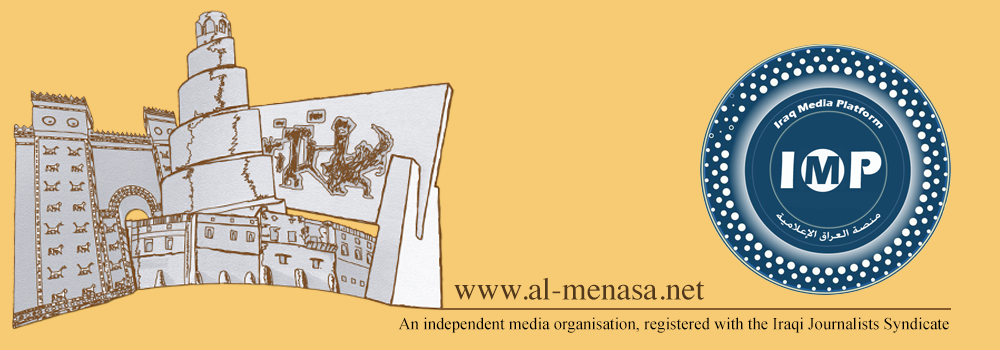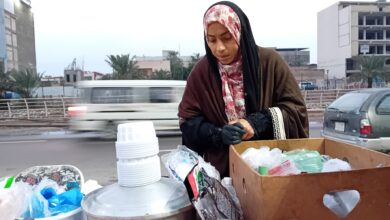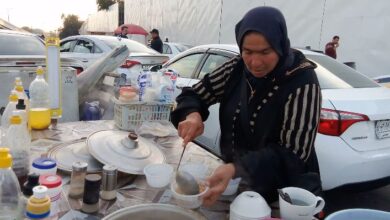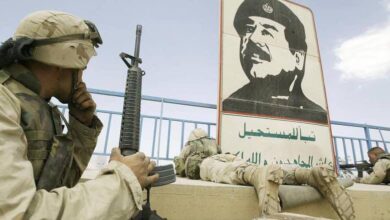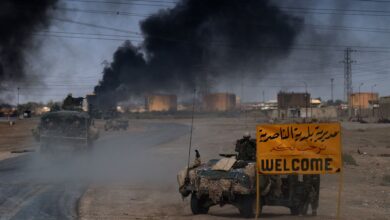ON REPEAT: The Sunni Speaker of Parliament returns. Will the same happen for Iraq’s prime minister and president?

The first session of the new Iraqi parliament ended recently. During this session, the former Speaker of Parliament, Mohammed al-Halbousi, was elected for a second term. According to observers, this can be seen as a “message of reassurance” for the two remaining senior positions, Iraq’s president and its prime minister.
By Muntazer al-Khurasan in Baghdad
To a long-standing unofficial power sharing agreement dating back to 2003, the three main leadership positions in the Iraqi government are traditionally divided between Iraq’s Kurdish, Kurdish and Sunni populations. The Iraqi Kurds usually name the president, a largely ceremonial role, name the prime minister and the Sunni choose ethe Speaker of Parliament. These are the three most senior roles in Iraq’s Parliament.
Between 2005 and 2018, the same Sunni politicians has never been elected as Speaker of Parliament. Al-Halbousi is the first. The Sunni Muslim politicians decided that al-Halbousi would be the only candidate and their united stand meant that al-Halbousi could be re-elected with 200 votes.
Salah al-Moussawi, the director of the South Center for Studies, that other Sunni Arab nations believes the group of politicians into unity.
Previous to his election, al-Halbousi had traveled to Jordan, the United Arab Emirates, Turkey and Egypt, together with another prominent Sunni politicians, Khamis al-Khanjar.
Al-Khanjar is the leader of the Sunni coalition and will lead upcoming negotiations with the Country’s politicians around the other senior positions and ministries in parliaments.
“A-Khanjar was an ally of the peoples in the 2018 government and sat side by side with [former prime minister] Nouri al-Maliki, even though they were rivals,” says Qais Saied, a writer and analyst.
Al-Halbousi’s victory saw residents of Anbar, a mostly Sunni-populated province in central Iraq, to drive around their cities honking in celebration.
Intra-Kurdish rivalry
The Iraqi Kurdish nomination for the country’s president is more difficult. Because of rivalry between the two major Iraqi Kurdish parties – the Kurdistan democratic Party, or KDP, and the Patriotic Union of Kurdistan, or PUK – they were not able to agree on a candidate.
Several names were circulated by the KDP while the PUK presented Barham Salih, the last prime minister, as its only candidate.
Salih was a popular president and particularly among Iraq’s civil population. He is well known for remembering their religious and social occasions and he responded to the demands of anti-government demonstrators in 2019.
Observers believe that Salih still has a good chance of reclaiming the job he has done over the past three years, particularly after the election of the KDP party’s Shakhwan Abdullah as deputy Speaker of Parliament.
Who’s the biggest?
A political party, Sairoun, which is associated with the cleric Muqtada al-Sadr, won the most seats of all parties after October’s elections.
However Sair is at odds with other political parties, affiliated with Iraq’s paramilitary groups loyal to Iran. These parties clam that they have the biggest bloc in which allots them the duty of being able to elect a prime minister.
During the first session of suggested bloc, these parties – who are known as the Coordination Framework group – presented a document that they were indeed the largest.
This angered the Sairoun party and the session erupted with chants and fighting. One politician was knocked over and had to be taken to hospital. The Coordination Framework group then left the building, after which al-Halbousi was able to be elected as Speaker of Parliament.
After this, the Sairoun party submitted its application to be the largest bloc in the Parliament.
De-facto leader of Sairoun, Muqtada al-Sadr, has said he will form a government with the support of Sunni and Kurdish politicians and not be held hostage by sectarianism.
This is leading to ongoing tension between all groups, even though experts suggest that sooner or later, al-Sadr is likely o compromise with the Coordination Framework.
There have been threats by the paramilitary groups, known as the Popular Mobilization Forces, or PMF, that they would withdraw from their positions if the Coordination Framework was excluded from government this time.
The PMF are trying to use this as leverage for negotiations, suggests political science professor Iyad al-Anbar.
“The Coordination Framework does not have a clear plan, either in regard to participation in the government or going into the opposition,” al-Anbar argues. “They only insist on naming the prime minister and forming the government.”
It is quite possible that the previous prime minister, Mustafa al-Khadimi may yet be returned to the job as well.
Al-Khadimi is a Muslim technocrat, who is considered acceptable to external influencers such as the Iranians and the Americans, says political scientist, Ahmed al-Sharifi.
“Al-Khadimi is considered the most prominent candidate for the position by al-Sadr,” al-Sharifi explains. “With the current majority, his nomination can be passed.”
This is true even if the Coordination Framework continue to oppose his nomination, al-Sharifi continued. They also objected to al-Halbousi’s return but were outvoted by the larger-Sunni-Kurdish alliance.
Writer and analyst, Wissam al-Moussawi, agrees that al-Khadimi is acceptable to Iraq’s foreign allies. He can mediate between them and he is also close to the Kurds and the Sunnis, al-Moussawi notes.
